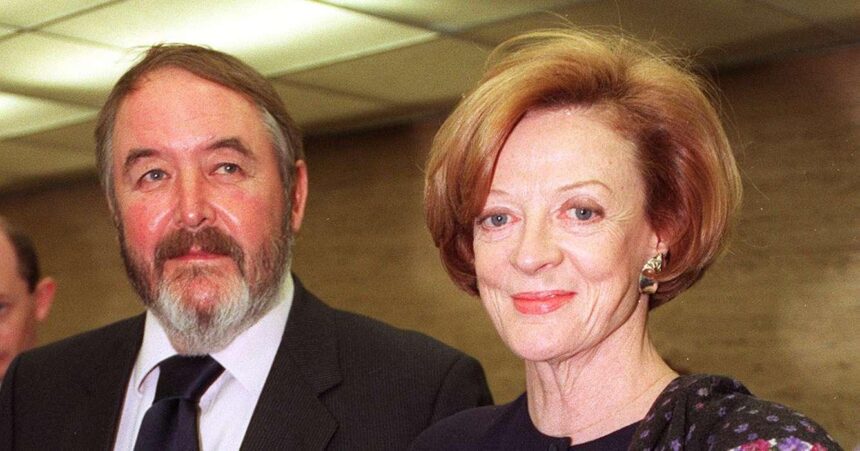Beverley Cross was an accomplished British playwright, screenwriter, and director whose work spanned several decades, leaving a lasting impact on British theatre and cinema. Though perhaps less well-known to the casual entertainment fan compared to some of his contemporaries, Cross’s contributions to the arts are immense, with a body of work that includes a diverse range of plays, screenwriting projects, and collaborations with some of the most notable names in the entertainment industry.
Cross’s influence extends beyond his writing; he was also a key figure in the cultural and artistic life of the 20th century. His relationships with other influential figures, particularly his marriage to renowned actress Maggie Smith, added layers of intrigue to his life and legacy. In this article, we will explore the life and work of Beverley Cross, from his early years to his prolific career as a writer, director, and his influence on British arts, alongside an exploration of his personal life, his challenges, and his enduring impact.
Early Life and Education
Beverley Cross was born on March 12, 1931, in London, England, to a working-class family. Raised in a time of great social upheaval and change, Cross was influenced early on by the arts and culture around him. As a young boy, he exhibited an interest in writing and the theatre, inspired by the world of drama and literature.
Cross attended St. Paul’s School in London, where he began to cultivate his creative talents, developing a deep love for literature, history, and the performing arts. His early interest in these fields would set the stage for what would become a remarkable career in the world of theatre.
After completing his schooling, Cross attended the University of Oxford, where he continued his studies and honed his skills as a writer. At Oxford, Cross’s creativity flourished, and he began writing and directing for the university’s theatrical productions. This period was formative for Cross, giving him the opportunity to experiment with different forms of drama and narrative while also becoming more involved in the theatrical world.
During his time at Oxford, he also met a number of future collaborators, actors, and directors who would play key roles in shaping his professional career. Cross’s education at Oxford was integral in shaping his worldview and further solidified his desire to pursue a career in the arts.
Early Career and the Rise of a Playwright
Beverley Cross early career was centered in the world of British theatre, where he initially found success as a playwright. Drawing inspiration from a wide variety of literary, historical, and social themes, Cross began to write plays that ranged from serious dramas to lighthearted comedies. His work as a playwright focused on examining relationships, identity, and the human experience in ways that captivated audiences.
The Trial of Red Lawrence (1961)
Beverley Cross first significant breakthrough came with his play The Trial of Red Lawrence, which was first staged in 1961. The play explored the politically charged environment of the time, particularly the issues surrounding justice and persecution. With its engaging characters and powerful message, the play brought Cross considerable recognition within the British theatre scene.
While The Trial of Red Lawrence was not immediately a commercial hit, it did showcase Cross’s knack for blending social commentary with compelling storytelling. His exploration of themes such as societal pressure, political loyalty, and the individual’s role in a larger political machine set him apart as a writer with something important to say.
The Bed Sitting Room (1963)
In 1963, Cross achieved a further breakthrough with his play The Bed Sitting Room, which would go on to become one of his most notable works. The play was a satire of British society and its post-war changes, offering a hilarious yet poignant take on the state of the world in the early 1960s. The Bed Sitting Room mixed absurdism with political commentary, a style that was becoming increasingly popular during this time.
The play, which was directed by famed director Sir Richard Eyre, was well received by critics and audiences alike. It demonstrated Cross’s ability to blend humor with serious social commentary, making a significant impression on the British theatre scene. The play was later adapted into a film, further cementing its place in British culture.
A Vision of the Future (1967)
Cross’s next major work, A Vision of the Future (1967), was an ambitious play that looked forward to a dystopian future in which society had collapsed. With this piece, Cross was able to explore his interest in science fiction and the potential consequences of political, social, and technological developments on human beings. The play resonated with the growing countercultural movements of the 1960s, offering an alternative vision of what the future might hold.
This play showed Cross’s capacity for creating narratives that weren’t bound by traditional dramatic forms. Instead, he experimented with structure, often offering unsettling glimpses of a world that was not far removed from the one in which people lived. This willingness to take risks was one of the defining aspects of Cross’s writing style.
Writing for Film and Television
While Cross was primarily known as a playwright, he also made significant contributions to film and television, working as a screenwriter and adapting some of his most popular plays for the screen. His versatility as a writer meant he was equally at home in the world of cinema, where his work continued to gain recognition.
The Bed Sitting Room (1969)
As mentioned earlier, Cross’s play The Bed Sitting Room was adapted into a film in 1969, with Cross himself contributing to the screenplay. The film was a quirky, surreal comedy that remained faithful to the themes and tone of the play. Although it was a commercial failure at the time of release, the film has since become a cult classic, beloved for its eccentric approach to storytelling and its satirical portrayal of British life.
In addition to The Bed Sitting Room, Cross worked on a number of other television and film projects throughout his career, bringing his signature wit and social awareness to a broader audience. His screenwriting credits include adaptations of plays, as well as original material that reflected his continuing interest in exploring complex social issues.
The Painted Veil (2006)
One of the most notable projects Cross worked on in his later years was the adaptation of W. Somerset Maugham’s novel The Painted Veil (2006), for which Cross wrote the screenplay. Directed by John Curran and starring Naomi Watts and Edward Norton, the film was a critical success and showcased Cross’s ability to adapt complex literary works for the screen.
Though not a commercial smash, The Painted Veil was well-regarded for its delicate exploration of love, duty, and the human condition, demonstrating Cross’s ability to translate deeply emotional narratives into engaging filmic experiences.
Personal Life: Marriage to Maggie Smith
Beverley Cross personal life was as intriguing as his professional career. He was married to actress Maggie Smith, a revered star of both the stage and screen, from 1975 until his death in 1998. The couple’s marriage was an enduring one, and their partnership was a significant aspect of both their lives. Maggie Smith, of course, became a household name through her work in films such as The Prime of Miss Jean Brodie (1969), The Lady in the Van (2015), and, more recently, her role as Dowager Countess of Grantham in Downton Abbey (2010–2015).
Cross and Smith were both passionate about their work, but their marriage was often described as a private, supportive partnership. Smith has spoken in interviews about how Cross’s support and understanding were instrumental in her own success. Though their professional worlds often overlapped, they kept their personal lives relatively private, preferring to focus on their careers while keeping their family life out of the public eye.
The Later Years and Legacy
Tragically, Beverley Cross passed away on March 20, 1998, at the age of 67. His death marked the end of a prolific and influential career, but his legacy continues to live on in the work he left behind. He had a profound impact on the British theatre scene, and many of his plays, particularly The Bed Sitting Room and A Vision of the Future, remain an important part of the cultural fabric of the 20th century.
Beverley Cross writing was ahead of its time, often reflecting the social, political, and cultural turbulence of the eras in which he lived. His ability to combine humor with serious social commentary made his works timeless, with themes that continue to resonate with audiences today. His work in film and television further cemented his status as one of Britain’s finest writers.
As a playwright, screenwriter, and director, Beverley Cross contribution to British arts cannot be overstated. His deep understanding of human nature, his fearless exploration of societal issues, and his distinct voice made him one of the most important figures in British theatre and film of the 20th century. While he may not be as widely known as some of his peers, his influence remains, and his work continues to inspire new generations of artists and audiences alike.
Conclusion
Beverley Cross remarkable career as a playwright, screenwriter, and director left an indelible mark on the world of British theatre and film. From his early plays to his contributions to cinema and Beverley Cross collaborations with influential figures such as his wife, Maggie Smith, Cross’s work remains a testament to his creative genius. His ability to blend humor, social commentary, and bold narratives has left a lasting legacy, and his influence continues to be felt in the world of the arts.







